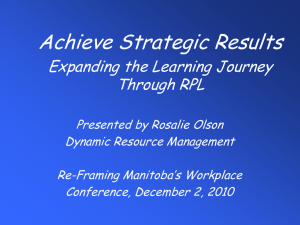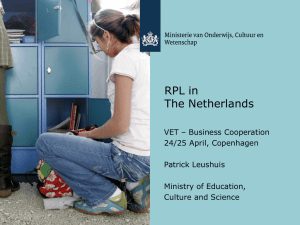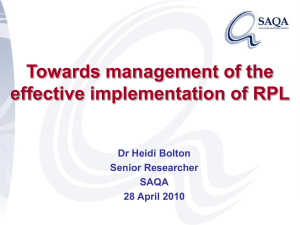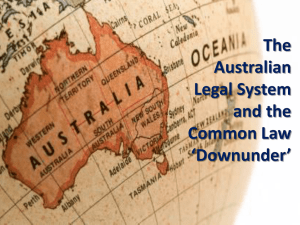DEEWR powerpoint
advertisement
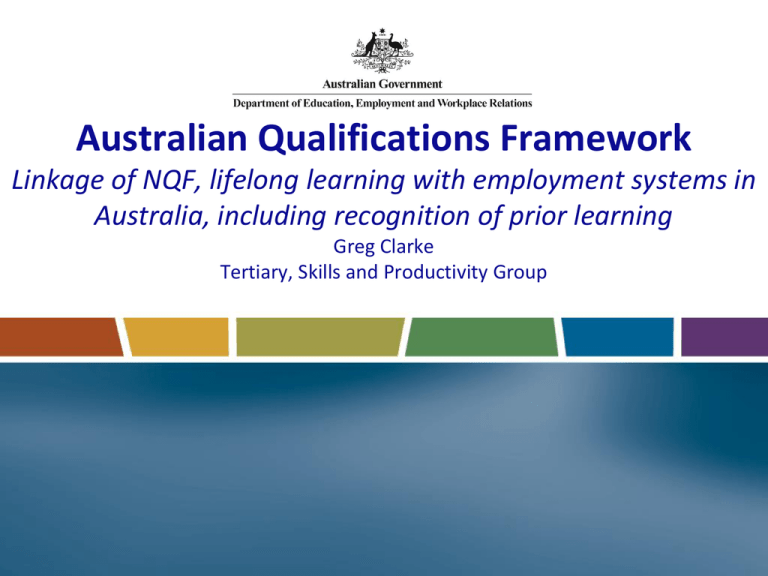
Australian Qualifications Framework Linkage of NQF, lifelong learning with employment systems in Australia, including recognition of prior learning Greg Clarke Tertiary, Skills and Productivity Group Key features of the Australian training system • • • • Strong industry leadership and engagement Training qualifications developed by industry Industry determines competencies (‘standards’) for each qualification National qualifications framework Guiding Principles Underpinning the Training System The guiding principles that underpin the national training system are: • • • • • Industry and business needs, both now and for the future, drive training policies, priorities and delivery. Better quality training and outcomes for clients are assured through more flexible and accelerated pathways. Processes are simplified and streamlined and enhance national consistency. Young people have opportunities to gain a wide range of lasting skills that provide a strong foundation for their working lives. Training opportunities are expanded in areas of current and expected skill shortage. AQF - National Qualifications Lifelong Learning for Australia • Is cradle to grave • Embraces all forms of education - primary, secondary, tertiary - workplace and on-the-job - private and recreational • Focuses on the individuals life course Key issues for Australia Issues Participation in education Elements Is increasing for VET and Higher Education for attainment to year 12 or VET equivalent Regional & rural areas Fewer opportunities Indigenous groups Have fewer prospects and more problems What is RPL? Recognition of Prior Learning (RPL) involves the formal assessment of previously unrecognised skills and knowledge that an individual has achieved outside the formal education and training system. RPL in Australia Provides a national qualifications standard for recognition of prior learning (RPL) Australian Qualifications Framework (AQF) Key Issues ─ RPL in Australia • Differences in understandings of terms • Impact of the Federal system on consistency of practice/funding • Differences in rationale for RPL • Need improved data collection, analysis and evaluation • No framework to determine optimal levels of RPL • Conflicting views about impact of funding on level and distribution of RPL in VET • Shortage of RPL assessors • Need for a culture shift to embed RPL into the system Government responsibility for RPL Ministerial Councils States & Territory Governments Regulation and delivery of education and training C’Wealth Government Funding of education and training (MCVTE & MCEETYA) Vocational Education and Training in Australia – Quality Assurance TRAINING PACKAGES AUSTRALIAN QUALIFICATIONS TRAINING FRAMEWORK (AQTF) Training Packages Nationally endorsed competency standards, assessment guidelines and Australian Quality Framework qualifications Developed by industry through national Industry Skills Councils Australian Apprenticeships Australian Apprenticeships offer: •A great way to get a head start in a chosen career. •Paid work and structured training that can be on-the-job, off-the-job or a combination of both. •‘Competency based’ which means you can complete your training faster if you reach the required skills level. •Existing skills and prior experience are recognised and course credit granted, potentially reducing formal training time. Available as full-time or part-time, also available part-time in many schools. •Leads to nationally recognised qualifications and skills which provide the basis for further education and training over the course of your working life. •A pathway from school to work. Australian Apprenticeships All Australian Apprenticeships translate to the Australian Qualifications Framework from Certificate I to Advanced Diploma. Training content of Australian Apprenticeships is based on a system of training packages. Industry Skills Councils AgriFood Skills Australia Community Services and Health Construction and Property Services Electro-Comms and Energy Utilities (Ee-oz) Forestworks Government and Community Safety (Government Skills Australia) Innovation and Business (IBSA) Manufacturing Industry Skills Council (Manufacturing Skills Australia) Resources and Infrastructure Industry Skills Council (Skills DMC) Service Skills Australia Transport and Logistics Industry Skills Council Governance • • • • ISCs are independent, not-for-profit companies which are managed by an independent board of directors. The directors include representatives from employer associations, industry associations and unions. The Australian Government fund ISCs and sets broad parameters that are required to meet specific roles in the national training system. The Board then sets the more detailed directions for their ISC. This recognises that each industry is different and has different needs. Funding to ISCs The Australian Government provides funding to ISCs to: • • • • provide industry intelligence and advice to Skills Australia, government and enterprises on workforce development and skills needs; actively support the development, implementation and continuous improvement of high quality training and workforce development products and services, including training packages; provide independent skills and training advice to enterprises, including matching identified training needs with appropriate training solutions; and work with enterprises, employment service providers, training providers and government to allocate training places. Strengthened Role for Industry Skills Councils The role of Industry Skills Councils has been expanded and strengthened as part of the Skilling Australia for the Future policy Industry intelligence and advice on workforce skills development. Independent skills and training advice to enterprises. Core role in developing Training Packages and support materials remains. Industry Skills Councils & Training Packages Nationally endorsed training packages are developed by Industry Skills Councils or enterprises to meet the identified training needs of specific industries or industry sectors. To gain national endorsement, developers must provide evidence of extensive consultation and support within the relevant industry area or enterprise. Australian Qualifications Training Framework (AQTF) • Ensures national consistency in recognition of qualifications, and delivery of training. • Required RPL to be treated like an other assessment and is subject to audit and monitoring. • Assessment is to meet requirements of relevant Training Package or accredited course. Legislative basis of AQTF • AQTF is underpinned by legislation enacted in each State and Territory • Enables individuals to have national recognition and portability of national qualifications and statement of attainment. • Different approaches in each State for providing State-wide policy frameworks for implementing RPL Useful Websites National Quality Council www.nqc.tvetaustralia.com.au/about_nqc AQTF http://www.training.com.au/aqtf2007/ Training Package Development Handbook www.tpdh.deewr.gov.au National Training Information Service www.ntis.gov.au Training Package Development and Endorsement Processes 2008 www.dest.gov.au/sectors/training_skills/policy_issues_reviews/Training_Package_Develop ment_Endorsement_Process_2008.htm Training.com.au www.training.com.au Training Packages @ Work www.tpatwork.com Policy Recommendations OECD Review Panel’s Policy Recommendations: • Develop a set of agreed national definitions of terms • More shared practice and collaborative research and evaluation between jurisdictions • A clearer and more widely understood rationale for RPL • Provide data on the long term impact of RPL on the individual or workplace including evaluations of RPL initiatives • Develop appropriate national RPL targets Policy Recommendations Develop a framework for analysing the effects of changes in RPL funding Professional development and a culture shift among professional workforce Embed RPL practice into the system by: o having champions of RPL in industry o providing modules on lifelong learning and RPL o promoting business success stories within industries o reinforcing public awareness o develop outreach activities – vocational guidance and systematic support Current initiatives • Council of Australian Governments (COAG) RPL Agenda – In February 2006 agreed to improve the practice and take-up of RPL and streamline RPL process • The Australian Qualifications Framework Council (AQFC) – developing common terms and definitions on credit transfer and articulation • Skilling Solutions Queensland Questions? Further contact details: Greg Clarke Branch Manager Tertiary, Skills and Productivity group Department of Education, Employment and Workplace Relations Canberra, Australia +61 2 6240 8224 or +61 412 654 498 Gregory.clarke@deewr.gov.au
